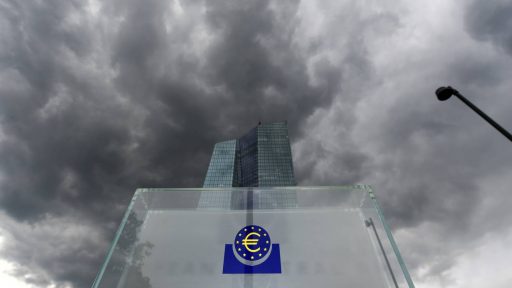

Quantitative easing carried out by the ECB have a positive effect on the weak economy. In essence, quantitative easing means purchasing government bonds and pouring money into the economy. The difference between the simple "buying of government bonds" by the central bank and "quantitative easing" is as follows: When buying government bonds at maturity of the bond, the state (in this case the borrower) owes interest to the creditor in this case ECB. The problem arises that the state can not pay this interest (if it can not return all its original credit) unless it acquire capital otherwise: private investors (funds) or sell non-state-owned enterprises. Quantitative relief has avoided the moment of "returning money". After the maturity of the bond, capital is reinvested immediately and this keeps the money flowing into the troubled economy. The problems faced by the ECB are as follows: In order to "credit" a country, the bank literally prints money that is poured into the economy, buy bonds, the state receives the necessary capital, and the central bank distributes them to the commercial banks, which lend themselves to the population. So the engine of the economy is running. But if this "printing" lasts too long, the market will be flooded with money .. more "commodity" (in this case money) lower demand, which will eventually lead to a fall in the value of the currency.
Presumably, the decline in the currency is positive to some extent for troubled countries. For example: A drop in EUR means that commodity prices in the Union (imported in foreign currency) will fall = national producers will suffer losses at national level when cheap imported goods dumped their prices. While an increase in EUR means that the demand for European goods will decrease. For example: If a US citizen can buy a BMW for 50,000 euros before, he has to pay 75,000. This will in most cases direct the buyer to a cheaper car (for example, the major competitor of BMW - Japan's Lexus).At the moment, the ECB is trying to smoothly reduce the quantitative easing (which is actually a good plan) if all countries have the stability of economies like France. But for countries such as Spain, Italy and Greece .. the reduction of QE will be a significant detriment. The country's money will decline, banks will stop lending (because they literally have no money), the economies of the states will start bucking, the investments will decline ... who wants to invest in a country that is about to go bankrupt? Noone! The best version of M.Dragi is currently not to reduce QE, but to increase the interest rate. So the impact on economies will not be significant.
The profit potential will be mainly in the troubled countries. Although the interest rate is increased, capital-turnover there will remain high. Stimulating lending in developed countries (which will happen with the interest rate increase) will make investors invest in countries where there is significant profit potential (not so well-developed infrastructure, international water and air transport centers). However, in Germany there are the largest and busiest airports (the same applies to France). But shipping is the most developed in countries like Italy, Spain and Greece (which are actually experiencing the biggest difficulties at the moment). Investing in companies located in these countries will most likely bring significant profits. The development of tourism will also flourish in these countries. More investment means acceleration of building hotels, improving infrastructure, etc., which means new orders for construction companies and road maintenance companies.
The biggest losses will be those in Europe that are not in the euro area but are closely linked to them. Bulgaria, Romania. As the interest rate and strong EUR increase, the subsidies for these countries will decrease. Investors will not want to invest in countries that are so underdeveloped that they are not even in the eurozone. Why invest in Romania when they can invest in Greece? In Greece the infrastructure is significantly better, the companies have a seaside location near Turkey (In Istanbul it is one of the biggest airports in Europe).
Since ECB did not buy Bulgarian government bonds, which means that the suspension of QE will not have such a great effect on the Bulgarian capital market. With an increase in the interest rate, we may see a shift from the capital market to deposits, but I think it will not be of great magnitude and the market won't be seriously affected. Greater reflection will be on construction and infrastructure. Higher interest rates mean that people will not want to borrow money to buy housing. I expect an initial decline in the pace of buying homes, which will lead to a fall in house prices and a drop in the cost of construction company shares.
Trader Bozhidar Arabadzhiev
 Varchev Traders
Varchev Traders Read more:
If you think, we can improve that section,
please comment. Your oppinion is imortant for us.











